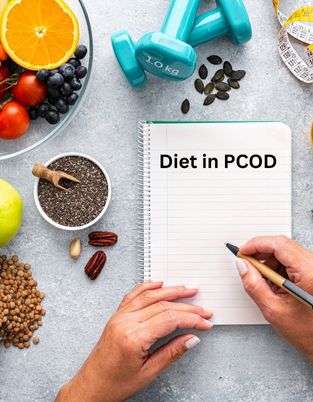Table of Contents
to irregular menstrual cycles, weight gain, and other metabolic issues. While medications and lifestyle changes are important, diet plays a significant role in managing PCOD symptoms. Including the right foods in your diet can help balance hormones, reduce inflammation, and maintain a healthy weight, making PCOD symptoms more manageable.
This article explores top foods to include in your diet for PCOD management, foods to avoid, and additional dietary tips to support overall well-being.
1. What is PCOD? Understanding the Condition
PCOD, or Polycystic Ovarian Disease, is a hormonal imbalance where ovaries produce excess androgens (male hormones) that interfere with ovulation. This often results in irregular periods, weight gain, acne, and sometimes infertility. Women with PCOD may also have multiple small cysts on their ovaries. Managing PCOD typically involves a combination of lifestyle modifications, medication, and a nutrient-rich diet.
2. The Role of Diet in PCOD Management
Diet plays a crucial role in PCOD management. Choosing foods that stabilize blood sugar levels, reduce inflammation, and support hormonal balance can significantly improve symptoms. Here’s how diet helps:
- Blood Sugar Control: Stable blood sugar levels reduce insulin resistance, which is often linked to PCOD.
- Hormone Regulation: Nutrient-dense foods support hormonal balance, reducing the overproduction of androgens.
- Weight Management: Managing weight through diet can alleviate symptoms and improve fertility.
Incorporating a balanced, low-GI diet and avoiding inflammatory foods can help women with PCOD lead healthier lives.

3. Top Foods to Include in Your Diet for PCOD Management
Adding specific foods to your diet can help in controlling PCOD symptoms and supporting hormone health. Here are some top choices:
3.1 Leafy Green Vegetables
Leafy greens such as spinach, kale, and Swiss chard are packed with essential vitamins like B vitamins, magnesium, and iron. These nutrients help regulate insulin levels and reduce inflammation, which is beneficial for PCOD.
- Nutrient Highlight: High in fiber, magnesium, and antioxidants.
- Serving Suggestion: Add leafy greens to salads, smoothies, or sauté them as a side dish.
3.2 Berries
Berries like blueberries, strawberries, and raspberries are low in sugar and high in antioxidants, which can reduce oxidative stress and inflammation. Their low glycemic index (GI) means they won’t spike blood sugar levels.
- Nutrient Highlight: Rich in antioxidants and fiber.
- Serving Suggestion: Enjoy a handful of berries as a snack or add them to yogurt and oatmeal.
3.3 Whole Grains
Whole grains like oats, quinoa, and brown rice are complex carbohydrates that help keep blood sugar stable. Unlike refined carbs, whole grains are high in fiber, which aids digestion and maintains energy levels throughout the day.
- Nutrient Highlight: High in fiber and B vitamins, supporting metabolic health.
- Serving Suggestion: Swap refined grains with whole grains in meals for better blood sugar control.
3.4 Fatty Fish
Fatty fish such as salmon, mackerel, and sardines are excellent sources of omega-3 fatty acids, which help reduce inflammation and improve insulin sensitivity. Omega-3s also support mental health, which is beneficial given that women with PCOD often experience mood swings.
- Nutrient Highlight: Omega-3 fatty acids for reducing inflammation.
- Serving Suggestion: Include fatty fish in meals twice a week for optimal benefits.
3.5 Nuts and Seeds
Nuts and seeds, especially almonds, walnuts, chia seeds, and flaxseeds, are packed with healthy fats, fiber, and magnesium. They help balance hormones, reduce inflammation, and support stable blood sugar levels.
- Nutrient Highlight: High in healthy fats, fiber, and protein.
- Serving Suggestion: Snack on a handful of nuts daily or add seeds to smoothies, oatmeal, or salads.
3.6 Legumes and Beans
Legumes like lentils, chickpeas, and black beans are great plant-based protein sources that help keep insulin levels steady. They are rich in fiber, which promotes satiety and supports weight management.
- Nutrient Highlight: Protein, fiber, and complex carbs for blood sugar control.
- Serving Suggestion: Use legumes as a protein base in salads, soups, or main dishes.
3.7 Avocado
Avocado is rich in healthy fats and fiber, making it ideal for stabilizing blood sugar levels. Its healthy fats help reduce inflammation and promote satiety, which aids in weight management.
- Nutrient Highlight: High in monounsaturated fats and fiber.
- Serving Suggestion: Add avocado to salads, smoothies, or toast for a nutrient-dense boost.
3.8 Cinnamon
Cinnamon has been shown to improve insulin sensitivity, making it a beneficial spice for women with PCOD. Adding cinnamon to meals can help regulate blood sugar and reduce cravings.
- Nutrient Highlight: Contains antioxidants that support blood sugar control.
- Serving Suggestion: Sprinkle cinnamon on oatmeal, smoothies, or yogurt for added flavor and health benefits.
3.9 Greek Yogurt
Greek yogurt is high in protein and probiotics, which promote gut health and support hormone balance. Probiotics help maintain a healthy microbiome, which is linked to better insulin sensitivity.
- Nutrient Highlight: Rich in protein and probiotics.
- Serving Suggestion: Enjoy Greek yogurt as a snack with berries or add it to smoothies for a protein boost.
3.10 Olive Oil
Olive oil is a heart-healthy fat that helps reduce inflammation. Its monounsaturated fats are beneficial for hormone health, and it can be used as a healthier cooking alternative to butter or vegetable oils.
- Nutrient Highlight: Monounsaturated fats for anti-inflammatory benefits.
- Serving Suggestion: Use olive oil as a salad dressing or for sautéing vegetables.
4. Foods to Avoid for Better PCOD Management
Just as there are foods to include, certain foods can aggravate PCOD symptoms and should be avoided:
4.1 Refined Carbohydrates
Refined carbs, such as white bread, pastries, and sugary snacks, cause rapid spikes in blood sugar and can worsen insulin resistance. Opt for whole grains instead.
4.2 Sugary Beverages
Sugary drinks like sodas and energy drinks can lead to blood sugar spikes and contribute to weight gain, both of which can worsen PCOD symptoms. Choose water, herbal tea, or unsweetened beverages.

4.3 Processed and Red Meats
Processed meats and red meat are often high in saturated fats, which can lead to inflammation and negatively impact hormone levels. Instead, choose lean protein sources like fish or legumes.
4.4 Trans Fats
Foods high in trans fats, like fried foods and certain baked goods, can increase inflammation and harm cardiovascular health. Avoid trans fats and opt for healthy fats from nuts, seeds, and olive oil.
4.5 Excessive Caffeine and Alcohol
Excess caffeine and alcohol can lead to hormonal imbalances and disrupt sleep patterns. Moderation is key, so limit coffee and alcohol intake for better hormonal health.
5. Additional Tips for Managing PCOD Through Diet
Alongside dietary choices, adopting a few lifestyle changes can further support PCOD management:
- Exercise Regularly: Physical activity helps improve insulin sensitivity and supports weight management.
- Stay Hydrated: Drink plenty of water to support metabolism and maintain optimal energy levels.
- Get Enough Sleep: Quality sleep is essential for hormonal balance and overall well-being.
- Practice Mindful Eating: Eating mindfully helps in portion control and reduces the likelihood of overeating.
Conclusion
Managing PCOD naturally starts with a well-rounded diet that includes nutrient-dense foods like leafy greens, berries, fatty fish, and whole grains. By focusing on blood sugar control and reducing inflammation through diet, women with PCOD can improve their symptoms, achieve better hormonal balance, and lead healthier lives. Avoiding refined carbs, processed foods, and sugary drinks, combined with regular exercise and adequate sleep, can make PCOD management more effective and sustainable.

